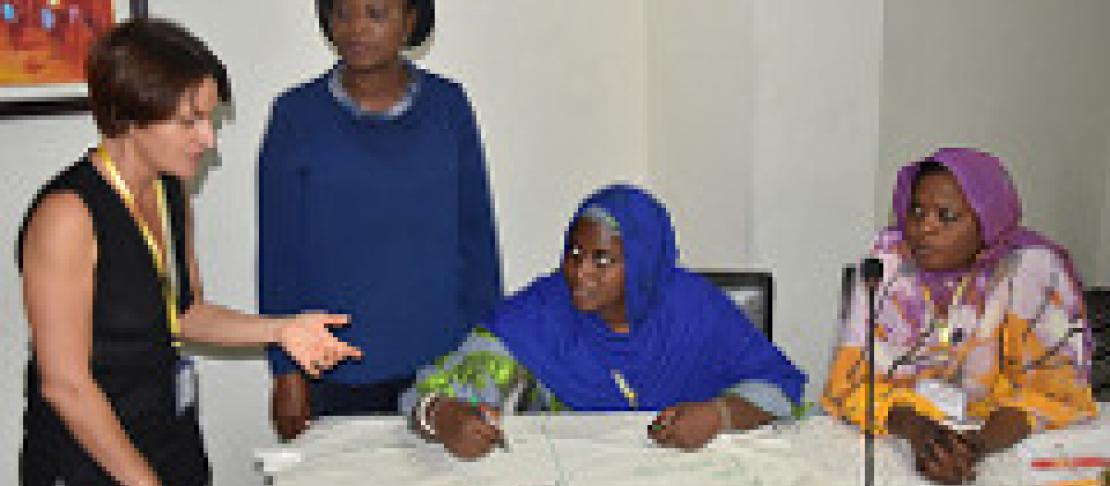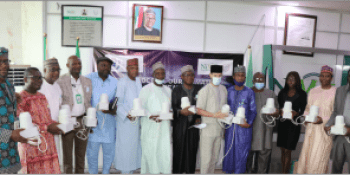Transforming West African agriculture in the context of climate change through South-South cooperation

What do Benin, Cape Verde, Chad, Djibouti, Madagascar, Mali, Mauritania and Niger have in common?
When it comes to resilience and sustainable agriculture as supported by the Adaptation for Smallholder Agriculture Programme (ASAP) of the International Fund for Agricultural Development (IFAD), the diversity of these countries quickly comes together, as revealed during a recent South-South exchange, organized by IFAD and the CGIAR Research Program on Climate Change, Agriculture and Food Security (CCAFS). The exchange brought together project implementers from eight IFAD projects, co-financed by ASAP to enhance climate resilience in the eight countries, all of them at different stages of implementation (from start-up to completion).
During the 5 days exchange, a variety of sessions took place, from technical presentations on climate-smart agriculture or weather information, to animated debates on common implementation challenges. A full day was dedicated to discussions, awareness raising and training on gender related aspects, and the workshop participants spent a day and a half around Bougouni, visiting and learning from the ASAP financed “Fostering agricultural Productivity Project” (PAPAM/ASAP) in Mali.
Throughout the week, discussions were animated, rich, and sometimes heated, as projects were eager to share their experience, ask for advice, and compare their similarities and differences. As a participant put it: “Being put together to discuss really gives us the opportunity to realise we are not alone! Sometimes, the others have great solutions to situations that totally block us”. During the first session, each team presented their project, and the participants were mildly sceptic when considering the diversity of implementation contexts. After the Niger team had explained how they rehabilitate degraded land, the Mali team had presented the successes of biogas, the Benin team developed the issue of reducing dangerous chemical inputs in horticulture and Djibouti’s team shared their experience on coral reef protection, a participant found the words to express how this diversity comes together: "The coral reef is like the tree and the forest. If you cut the tree, if you remove the forest, the animals will not come any more, the ecosystem will fall apart”, launching a discussion on the importance of ecosystem conservation to ensure sustainable productivity in the context of climate change. The(se) discussions gave way to core themes the project teams are regularly faced with: the complexity of monitoring and evaluation; the question of mainstreaming not only gender but also environment, climate, and nutrition and the tools that can be used to do so; the matter of safeguards and how IFAD expects projects to implement them; and most of all, the stake of sustainability.
The second day of the workshop focused on exchanges and reflexions on gender, and opened with a presentation by Dr Mathieu Ouedraogo on CCAFS’ experience in integrating gender related aspects in projects in West Africa. The rest of the day enabled participants to become actors of the reflexion through practical sessions, exercises and debates on gender related aspects, animated by Emily Janoch from Care International.
On the third day of the workshop, the participants travelled to Bougouni, 150km South of Bamako, for three field visits presenting the experience of PAPAM/ASAP: one on biogas, the second showing how participatory mapping and the involvement of local authorities enabled to efficiently install a women managed market garden equipped with solar pumping, and the last presenting how market access was improved through participatory planning, by building a bridge connecting production areas with commercial areas. The participants were most impressed by the biodigestors, a technology that not only has added value to manure by improving its fertilizing power, but that has most of all been key to women empowerment. Thanks to biogas, the time required for the preparation of meals and washing of cooking pots has been drastically reduced, cooking is safer and easier, and women spend much less time looking for firewood. They have more time for themselves and to take care of the children, and the community has managed to reduce its impact on forest resources. Workshop participants asked many detailed questions relating to technical aspects, all of them eager to identify whether and how the experience could be replicated in their country.
During the last day of the workshop, the projects teamed up for presentations on guaranteeing the sustainability of investments and local stakeholder engagement; scaling up through national policies, addressing start-up related issues, and integrating transversal aspects such as gender, nutrition, and climate in project implementation. The exchange was also an important avenue for science-practitioner engagement, bringing expertise from the CGIAR and national research partners to address implementation challenges, and charting out a pathway for deeper engagement with scientific partners. The exchange led to the creation and recognition of a community of practice, represented by the members of the project teams. All acknowledging the need for more exchanges with other French-speaking colleagues, also faced with the challenge of mainstreaming climate and environment in their projects.
- Read the blog on the focus on gender during the exchange workshop
Maëlle Peltier works for IFAD.



